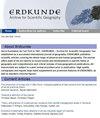Codifiability and geographical proximity of supply networks in automotive industry
IF 1.1
4区 社会学
Q3 GEOGRAPHY
引用次数: 0
Abstract
This methodological paper proposes two codifiability indicators to examine trade and manufacturing statistics and the spatial distribution of value-added manufacturing activities. Codifiability is defined as the level of documentation about the manufacturing processes of a product required to allow tasks to be replicated by other suppliers. First, the codifiability indicators allow researchers to examine products that are grouped under the same sub-product class in conventional statistics, but the manufacture of such products could involve vastly different technologies and thus the level of value-added. A proprietary database was used to delineate the supply networks of automakers in passenger vehicles and their major tier-I suppliers between 2000 and 2015. Second, codifiability allowed the researchers to unpack the spatial distribution of value-addedness of each supplier in the production network, as illustrated by the top two parts suppliers to the automotive industry, Bosch and Denso. The importance of codified standardized commodity parts with lower value-added in the continental European home market illustrates the importance of geographical proximity for Bosch, while the dominance of non-standardized service parts with lower level of codification and higher value-added in its exports to North America is also consistent with the ‘follow the customers’ process in the overseas market reported in the automotive industry. The relative importance of service parts with lower level of codifiability in Denso’s home market illustrates the division of labour with other cross-holding suppliers (especially Aisin and JTEKT) and thus the effects of the interlocking cross-holding of Japanese automobile and parts suppliers, which reconfirms the importance of cultural proximity in Asia’s (Japanese) supply networks.汽车行业供应网络的可编码性和地理邻近性
本文提出了两个可编纂性指标,以检验贸易和制造业统计数据以及增值制造业活动的空间分布。可编码性定义为允许其他供应商复制任务所需的产品制造过程的文档级别。首先,可编码性指标使研究人员能够检查在传统统计中被归为同一子产品类别的产品,但此类产品的制造可能涉及截然不同的技术,从而提高增值水平。一个专有数据库用于描述2000年至2015年间乘用车汽车制造商及其主要一级供应商的供应网络。其次,可编码性使研究人员能够揭示生产网络中每个供应商的增值空间分布,汽车行业的前两大零部件供应商博世和电装就是例证。在欧洲大陆本土市场中,具有较低附加值的编码标准化商品部件的重要性说明了地理位置接近对博世的重要性,而编码水平较低、附加值较高的非标准化服务部件在其北美出口中的主导地位,也与汽车行业报道的海外市场的“跟随客户”流程相一致。在电装的国内市场中,可编辑性较低的服务零部件的相对重要性说明了与其他交叉控股供应商(尤其是爱信和JTEKT)的分工,从而也说明了日本汽车和零部件供应商的连锁交叉控股的影响,这再次确认了文化接近在亚洲(日本)供应网络中的重要性。
本文章由计算机程序翻译,如有差异,请以英文原文为准。
求助全文
约1分钟内获得全文
求助全文
来源期刊

Erdkunde
地学-自然地理
CiteScore
2.00
自引率
7.10%
发文量
17
审稿时长
>12 weeks
期刊介绍:
Since foundation by Carl Troll in 1947, ''ERDKUNDE – Archive for Scientific Geography'' has established as a successful international journal of geography. ERDKUNDE publishes scientific articles covering the whole range of physical and human geography. The journal offers state of the art reports on recent trends and developments in specific fields of geography and comprehensive and critical reviews of new geographical publications. All manuscripts are subject to a peer-review procedure prior to publication. High quality cartography and regular large sized supplements are prominent features of ERDKUNDE, as well as standard coloured figures.
 求助内容:
求助内容: 应助结果提醒方式:
应助结果提醒方式:


